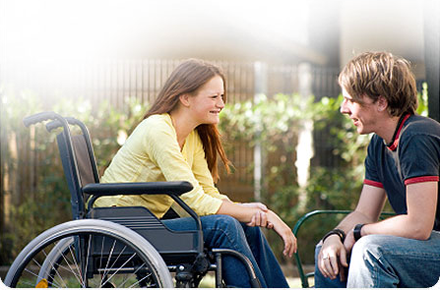“Disabled people are generally seen as being asexual and genderless, and images of us are largely confined to medical or charity based usage. But in fact we are as able to form relationships and live life to the full as everybody else, and we are represented in every walk of life.” (cf TLC Trust)
Can disabled people be sexy? F***yeah. Living with a disability or an chronic illness does not necessarily affect your sexual desires and needs. What it does change is your social position when it comes to sex: it affects your access to informations, sexual partners, support for your sexual choices. Why? Stereotypes in society. Whilst we increasingly learn to understand the part of structure of society that disables people by setting up a norm and constructing everything around it, we should not forget the sex matters in this context.
Watch this great video on Sex and Disabilities.
The problem is that we think of people with disabilities almost only as people who are helpless, who need to be not only supported, but protected. They are victimized, and victimization puts you into a position where there’s not much you can do about it except appealing to people’s sympathy, beg for mercy and wait for people to help you. But those are acts of charity. Now charity is of course not a bad thing, but it’s not a solution, it’s simply an alleviation – with charity, cause and effect remain untouched, while charity itself is a side-effect of the cause it is trying to alleviate. Got it? But people with disabilities usually don’t want our mercy, they want to make their own decisions.
Do you agree? Well then think about sex and you’ll see that it get much more complicated. Think for instance about being in a bar and there’s a good looking guy or girl, but you don’t feel like starting to flirt, because this person sits in a wheelchair. A little hater pops up in your head and asks you ‘what will the people think?’ They’ll ask themselves how strange this guy/ girl may be having the hots for disabilities, trying to take advantage of this helpless being…’.

You can only take advantage of a person who’s at your mercy, who’s not mature or responsible enough to make his or her own decisions. So we victimize people with disabilities, but we especially do it when it comes to sex. We already deny women to be sexually self-determined and try to attach stereotypes of special needs for protection from others when it comes to topics like porn or prostitution. Imagine how much we do it with someone with a disability in the context of sex – not to mention the dimension of it when it comes to a woman with a disability. We do it to an extent where we construct negative asexualizing stereotypes. But we are not talking about asexual people. We are talking about an adult, a grown up person. Disability does not equal sexual disability – that’s a stereotype. I’ve said it once before talking about the toilet-signs: we have toilet signs for women, we have those for men, and we have toilet signs for disabled people. There are the two sexes and the sexless which symbolizes this particular stereotype.
There already are projects like Shada that aim at building up a more inclusive society, respecting every disabled person’s ‘unique sexual identity and non-judgemental recognition and acceptance enabling its diverse expression and celebration’. It’s about learning to understand, and starting to rethink. Here’s much more information on concrete aspects, that I found very helpful.

